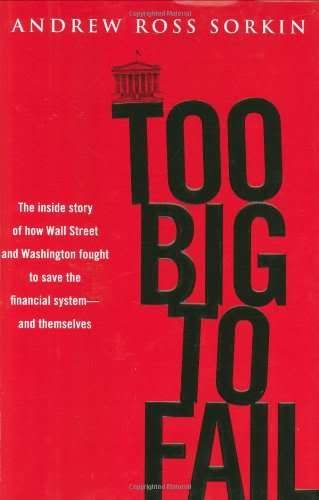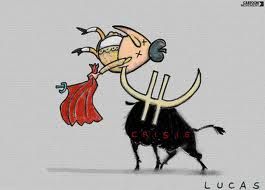Cross posted from The Stars Hollow Gazette
Last Thursday Mario Draghi, the president of the European Central Bank, won almost unanimous support for an unlimited bond purchase that would relieve the pressure on financial troubled countries by spreading the repayment of debt to Euro Zone countries as a whole:
The central bank’s program will not solve the deep structural problems of the euro, Europe’s common currency. But it will buy time for the political leaders of the 17-nation euro zone to follow through on their past promises to discipline each others’ spending more closely and work harder to relax labor regulations and barriers to business creation that are regarded as impediments to growth.
The central bank will buy bonds on open markets, without setting any limits, in contrast to an earlier bond-buying program that proved too hesitant to be effective. The bank said it would act only after countries agreed on certain conditions with the euro zone rescue fund, the European Stability Mechanism. That fund, known as the E.S.M., would buy bonds directly from governments, taking responsibility for imposing the conditions, while the central bank would intervene in secondary markets. [..]
The one dissenting vote came from Germany’s central bank, the Bundesbank, that was cast by Jens Weidmann despite Chancellor Andrea Merkel’s support for the plan.
But no so fast. The plan relies heavily on Spain and Italy to ask for help from the ECB. Both governments expressed reluctance for fear of political back lash at home and the harsh policy changes that they would have to accept. Spanish Prime Minister Mariano Rajoy took the stance that Spain would not be forced into asking for assiatance from the ECB until the conditions were made “crystal clear”:
After Mario Draghi, European Central Bank governor, made clear that any assistance from the central bank to reduce Spanish borrowing costs would come with “strict and effective” conditionality, the Rajoy government remained steadfast in its view that a request would only be made if, and when, it is ready. High quality global journalism requires investment.
“There is no urgency,” a Spanish official said following a joint press conference between Mr Rajoy and Angela Merkel, where the German Chancellor deftly avoided a series of questions over possible new conditions for Spain. [..]
The Spanish prime minister is aware of the disastrous political consequences a direct request for a bailout would have on a nine-month-old government that was elected on a pledge to avoid the fate of Greece, Portugal and Ireland.
At the FDL News Desk, David Dayen gives his analysis:
Basically, Rajoy is saying “do your worst.” And he has some leverage. The Eurozone might be able to survive without Greece, but Spain is too big to fail. Draghi is adamant that he will not rescue the bond yields of any state that does not comply, but that has not been confirmed by events. So we have a game of chicken. And Rajoy, who campaigned on avoiding the fate of Ireland and Greece and Portugal, has political reasons to remain steadfast. He wants to keep the troika out of Spain; it’s political suicide if they come in and tell him how to manage the Spanish economy.
The knowledge among bondholders that Rajoy could at any time sign up for aid may be enough to keep them at bay relative to Spanish debt, and the debt of other sovereigns. That’s my hope, anyway. Because forcing Spain into more brutal austerity will turn out just the way it has turned out in Britain and any other country with a fragile economy.
From the annual Ambrosetti Forum at Lake Como on Friday, economist Nouriel Roubini gave his assessment:
“The ECB move is helpful but is not a game-changer. The eurozone is still in crisis,” said Nouriel Roubini, head of Roubini Global Economics.
“Unless Europe stops the recession and offers people in the peripheral countries some light at the end of the tunnel – not in five years but within 12 months – the political backlash will be overwhleming, with strikes, riots and weak governments collapsing.”
Professor Roubini said the German Bundesbank and will insist that “severe” conditions are imposed on Spain once the country requests a rescue from the eurozone EFSF/ESM bail-out funds and signs a memorandum ceding budgetary sovereignty.
“Plenty of accidents can still occur. There is austerity fatigue in the periphery and bail-out fatigue in the core. Eveybody is restless,” he said [..]
This current plan only kicks the can down the road. There are structural problems of the Eurozone system that must be addressed to adequately resolve this crisis:
There is a structural contradiction within the euro system, namely that there is a monetary union (common currency) without a fiscal union (e.g., common taxation, pension, and treasury functions). In the Eurozone system, the countries are required to follow a similar fiscal path, but they do not have common treasury to enforce it. That is, countries with the same monetary system have freedom in fiscal policies in taxation and expenditure. So, even though there are some agreements on monetary policy and through European Central Bank, countries may not be able to or would simply choose not to follow it. This feature brought fiscal free riding of peripheral economies, especially represented by Greece, as it is hard to control and regulate national financial institutions. Furthermore, there is also a problem that the euro zone system has a difficult structure for quick response. Eurozone, having 17 nations as its members, require unanimous agreement for a decision making process. This would lead to failure in complete prevention of contagion of other areas, as it would be hard for the Euro zone to respond quickly to the problem.
In addition, as of June 2012 there was no “banking union” meaning that there was no Europe-wide approach to bank deposit insurance, bank oversight, or a joint means of recapitalization or resolution (wind-down) of failing banks. Bank deposit insurance helps avoid bank runs.
So countries like Greece, Ireland, Italy, Spain and Portugal, who find themselves in a financial crunch, must rely on the not so “goodwill” of countries like Germany who are reluctant to share the pain.



 As
As  The economic crisis in Spain was supposed to have been resolved in an
The economic crisis in Spain was supposed to have been resolved in an  The heads of state of the EuroZone countries met in Brussels today for a two day summit to try to come to an agreement on
The heads of state of the EuroZone countries met in Brussels today for a two day summit to try to come to an agreement on